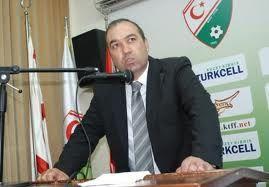By Andrew Warshaw, Chief Correspondent, in Nicosia, Cyprus
January 16 – After more than half a century of isolation during which they have become international outcasts, football officials of Turkish-controlled northern Cyprus will sit side-by-side with their Greek counterparts on Thursday for landmark talks aimed at unifying the sport on the deeply divided Mediterranean island.
In a massively symbolic gesture that has potential ramifications far beyond fans on both sides of the island, Cyprus Football Association president Costakis Koutsokoumnis will visit the headquarters of the unofficial Cyprus Turkish Football Association – recognised only by Turkey – for formal discussions with his opposite number, Hasan Sertoglu (pictured), aimed at improving mutual co-operation.
The meeting, the first ever on Turkish Cypriot soil, will, crucially, be attended by observers of both FIFA and UEFA. It follows a reciprocal visit to the CFA – Fifa members since 1948 – by Sertoglu last month and is being hailed as the biggest breakthrough to date in an effort to give Turkish Cypriot players fresh hope of competing internationally and ending their footballing limbo.
Greek and Turkish Cypriot clubs played together in an all-Island league until 1955 when they were forced to go their separate ways. The island has been divided politically since the 1974 Turkish-led invasion and although United Nations efforts at re-unification are still ongoing, they have so far failed to yield results.
In an interview on the eve of the eagerly awaited talks at his Nicosia office close to the UN-controlled buffer zone, Sertoglu cautioned against an overnight solution. But, he said, Thursday’s exchange of views could not be under-estimated in terms of his federation – whose entire annual budget of €2.6m dwarfs the salaries of scores of top players in the major European leagues – gaining much-needed fresh impetus after decades of stagnation.
Just as importantly, he said, it was about using football as a tool for change on an island where the politicians have consistently dug their heels in. Most recently that meant blocking a 2008 Fifa initiative to try and find common ground between the Greek side, where football is largely professional in the top division, and the breakaway Turkish side where the sport has a long history and comprises 48 clubs in three active divisions but where standards and facilities are suffering.
Most players are at best semi-professional with second jobs and with little incentive for their clubs to progress, attendances sometimes only just reach three figures, with 1,500 for derby games.
“The politicians are not involved this time, they are too scared,” said Sertoglu. “In fact I would say politically things are worse and I can’t see a solution. Since we can’t leave it to the politicians, as football men we have to solve this problem ourselves. Although we know it will be difficult, we are hopeful of a solution.”
Details of Thursday’s talks are wrapped in secrecy but the goal is for teams on both sides of the island to play against each other pending eventual re-unification. “Obviously it’s a sensitive negotiating process but we need an agreement because our young players have lost all their morale,” explains Sertoglu, a former club president who has a signed Liverpool ball on his desk.
“Our kids need better training. We want to carry on controlling our footballing destiny but we also want to be recognised by the governing bodies.”
That will take compromise particularly since their neighbours, on paper at least, have little to gain from any agreement other than harping back to the past. Only last year, Apoel Nicosia reached the quarterfinals of the Champions League but Sertoglu refutes the suggestion that unification talks will end in tears for his federation, which controls one of the world’s oldest but forgotten leagues. While Cypriot citizens have moved freely across the borders since they re-opened in 2003, football is still locked in separation even though Cetinkaya, the leading team on the Turkish side, was one of the eight founder members of the once unified CFA back in 1934.
Now, said Sertoglu, Greek and Turkish Cypriots might – just might – have a chance to play both for and against the same clubs once again. “I am Cypriot first, Turkish second. The very fact that the CFA president is coming to our headquarters, and showing we exist, is a huge step. He wouldn’t risk coming just for public relations. It’s just the beginning of the process but this is his moment to show the world that in this little island football can become one.”
Contact the writer of this story at zib.l1751422393labto1751422393ofdlr1751422393owedi1751422393sni@w1751422393ahsra1751422393w.wer1751422393dna1751422393

